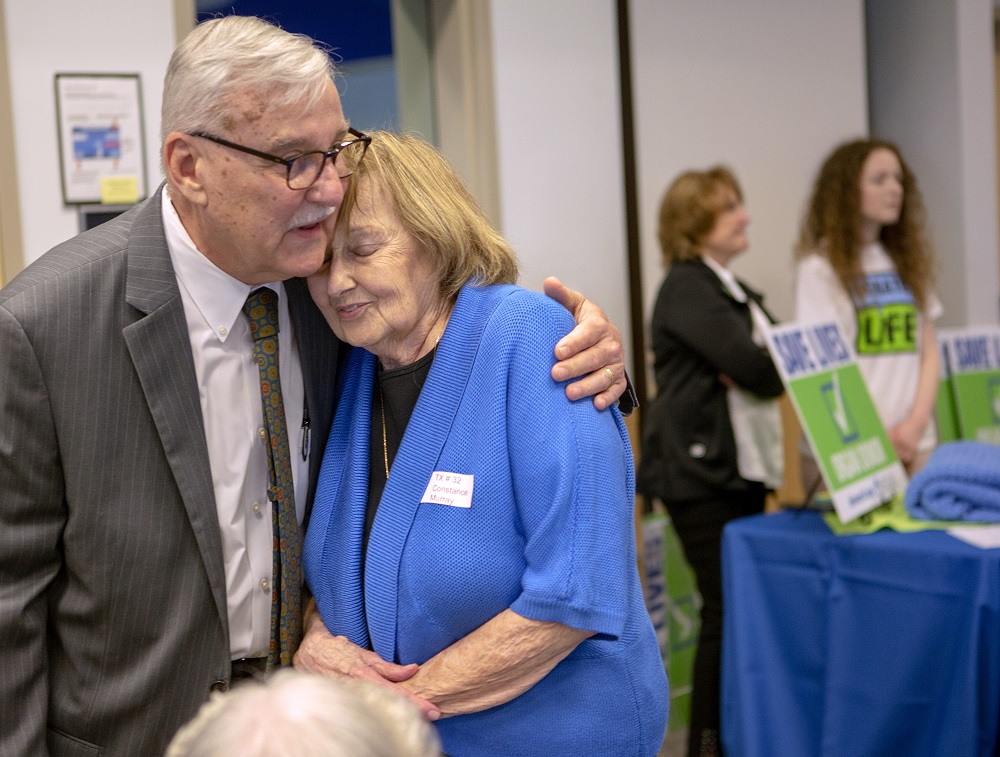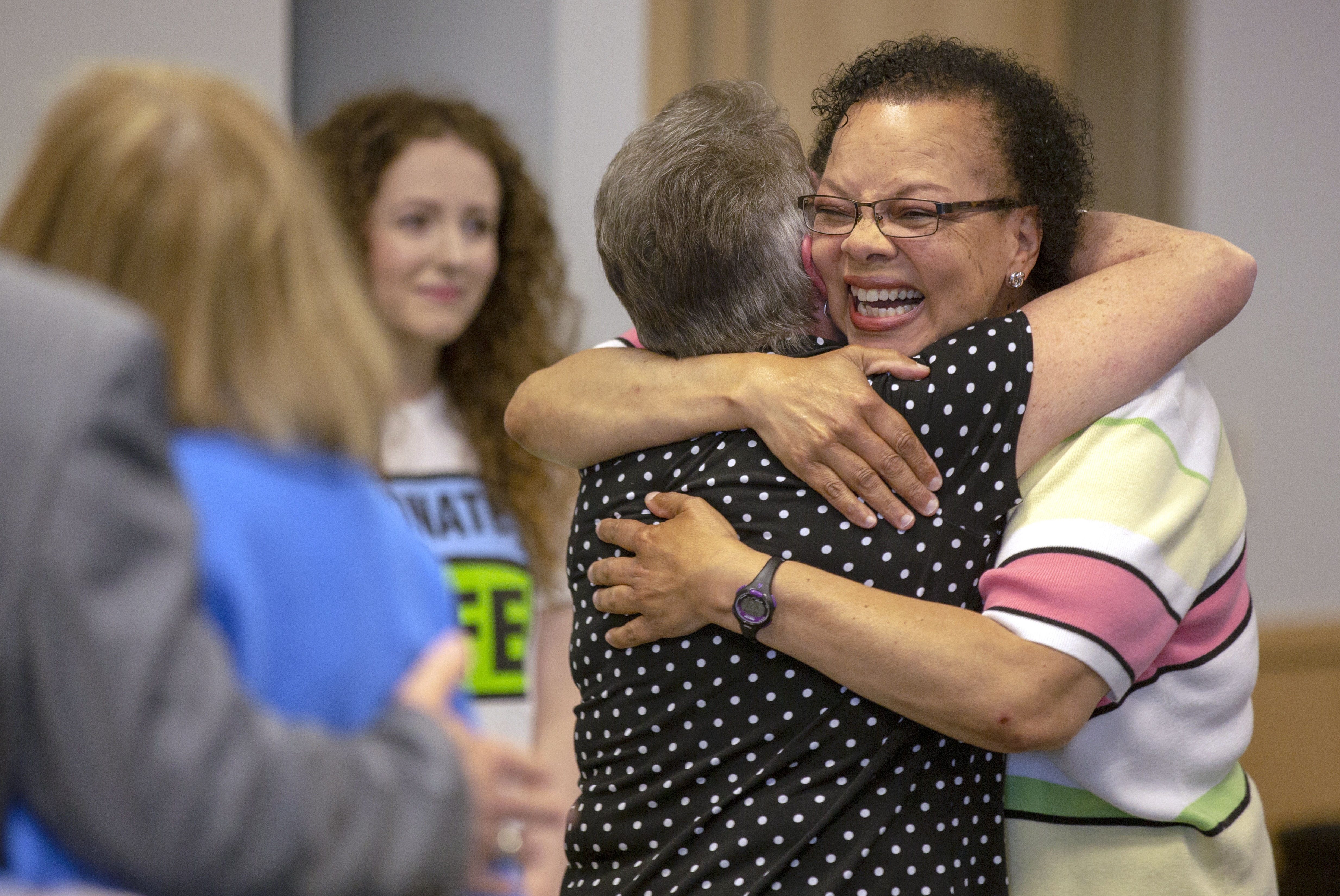And the beat goes on…heart transplant patients, surgeons reunite

To Constance Murray, heart transplantation sounded like something out of science fiction movie – one she certainly didn’t care to star in.
It was 1986, and Murray had struggled for more than a year with shortness of breath when she climbed stairs or walked even a short distance. Her symptoms were steadily worsening.
When a diagnosis of congestive cardiomyopathy was made, Murray faced two choices – medications that had about a 1% chance of working or a heart transplant.
“Heart transplant surgery was new then,” the New Cumberland resident said. “I had read about people dying after it. I said ‘no.’ I couldn’t handle the thought of that.”
Things only worsened.
“I had so many brushes with death and was rushed to the hospital several times,” Murray said. “My husband Jack finally said, ‘What do you have to lose?’”
Murray was an excellent candidate because she had no other health problems.
Fast-forward 33 years and Murray, now 80, can’t believe she ever considered passing up the gift of life that transplantation gave to her.
“I’m definitely glad I did it,” said Murray, who fought challenges from the first anti-rejection drug she took but now tolerates a newer one very well. “Most of my health problems since then haven’t been from my heart – they’ve been orthopedic.”
At this year’s annual reunion of heart transplant patients, each wore a number designating their place in the lineup of 518 heart transplant surgeries since Penn State Health Milton S. Hershey Medical Center performed its first one in 1984.
Murray is No. 32 – and the longest-surviving transplanted patient at the Milton S. Hershey Medical Center.
“Connie’s heart does spectacularly, and it’s always a joy to see her,” said Dr. John Boehmer, cardiologist and director of the heart failure program at the Medical Center. “We now have a cohort of eight octogenarians. Their immunosuppressants work well, and they deserve credit for taking their medicine religiously and keeping their appointments with us.”
Hershey Medical Center boasts a one-year survival rate of 100% in the most recent 2 ½- year cohort of patients reported by the Scientific Registry of Transplant Recipients, Boehmer said. More than 200 heart transplant recipients currently receive follow-up care at the Medical Center and will for the rest of their lives.
An average of 15 heart transplant surgeries are done annually by the transplant team at the Penn State Heart and Vascular Institute, which includes surgeons, nurse coordinators, nurse practitioners, social workers, a financial counselor and pharmacists, along with support staff.
Last year, the team did eight transplants in 31 days, breaking an institutional record for the fastest rate of transplantation.
“It was a combination of getting enough patients evaluated and being fortunate enough to be able to get some good hearts,” Boehmer said. The recipients have waited for months to years for their new hearts.

“Most of the time, I or one of other transplant coordinators call the patients to tell them a heart is coming,” said Courtney Post, one of the transplant coordinators who guides patients through the pre- and post-transplant process and serves as a liaison between patient and doctor. “Most of them are shocked that it’s finally happening but very happy.”
Hershey Medical Center is central Pennsylvania’s comprehensive heart failure program, also offering advanced clinical trials and expertise in blood pumps that can support patients until transplant or serve an alternative for those who are not candidates for transplant, Boehmer said.
The Medical Center has been at the forefront of finding new ways to improve outcomes for heart transplant patients, including less invasive techniques to detect transplant rejection at the molecular level.
“The operation itself really hasn’t changed a great deal,” Boehmer said. “Immunosuppressant therapy has really evolved, as has how we monitor for rejection.”
Heart and Vascular Institute cardiologist Dr. Howard Eisen has been instrumental in research into a blood test that can analyze heart transplant patients’ genes and predict risk for rejection, sparing them the need for routine heart-muscle biopsies.
The heart transplant patient reunion, which drew almost 100 patients and family members this year, is a highlight of the year for both recipients and the doctors and staff of the transplantation team.
“We do it for the patients, but it’s really a treat for us and tremendously rewarding to see people doing so well so many years after transplant,” Boehmer said.
The biggest heroes, however, are missing – the donors, he said. “Sometimes, organ donation is the only blessing in a tragic circumstance,” Boehmer said. An organ donor remembrance ceremony takes place at the Medical Center each year.
Murray said she still thinks of the 24-year-old donor whose heart beats in her chest. “I think his heart likes me,” she said. “I do everything I can to take care of it – for both of us.”

If you're having trouble accessing this content, or would like it in another format, please email the Penn State College of Medicine web department.
